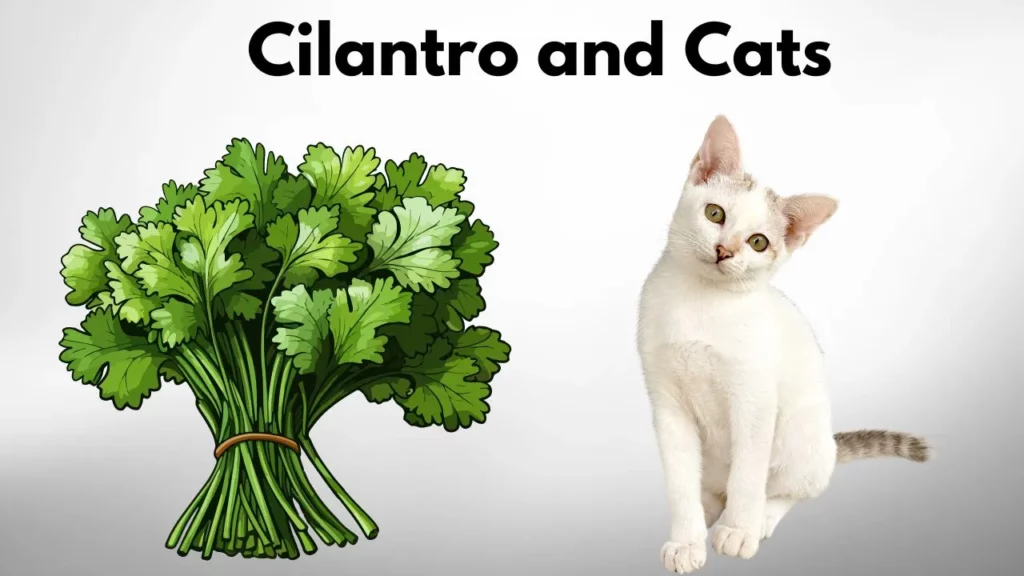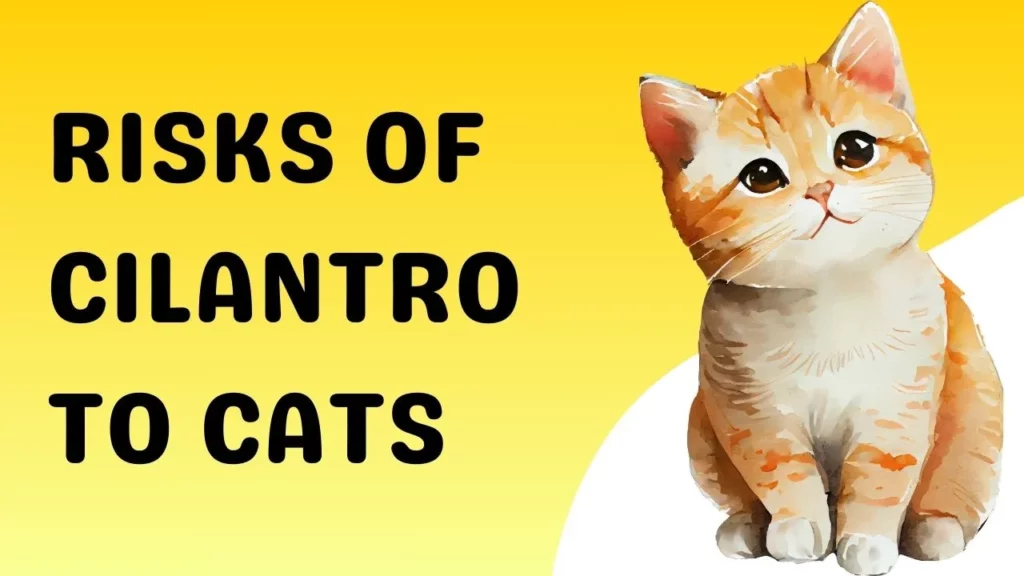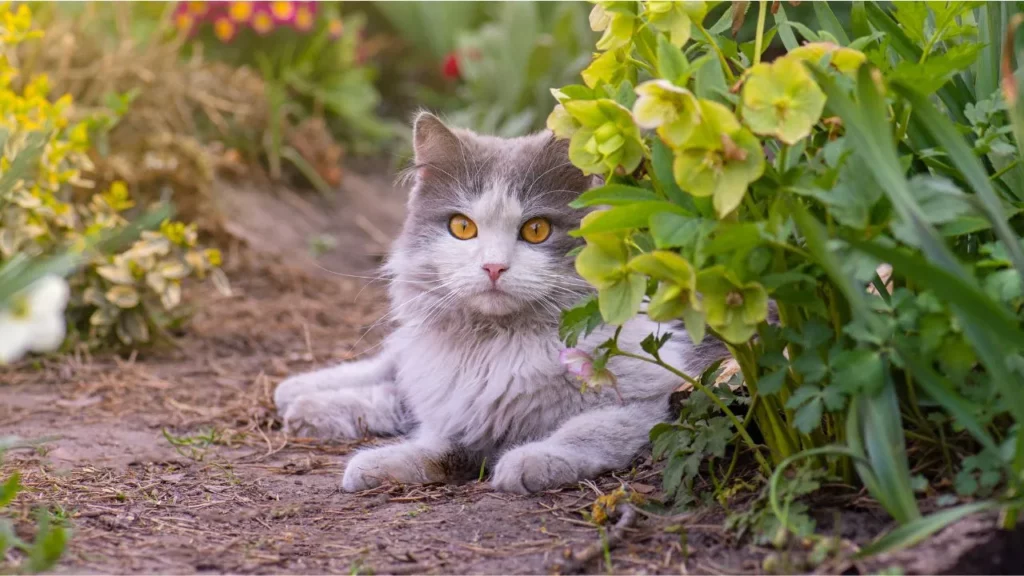Cilantro is another name people mostly use for coriander, another name for cilantro, in various international cultures. Its unique flavor and smell attract some people, while others dislike it. Mint, normally acceptable for cats to consume sometimes, is related to cilantro.
But just because cilantro isn’t toxic doesn’t mean cats need to eat it or benefit from it. As a cat owner, you may wonder about the safety of feeding your dog or cat a particular food. Cilantro is an herb with a unique taste and flavor that people often use in food preparation.
Cilantro and Cats

Common Toxic Foods for Cats
Cilantro is not harmful to cats, according to the ASPCA. Garlic, onions, flowers, and chocolate are toxic plants for cats, but cilantro is not on that list. However, this does not mean cilantro is safe or helpful for cats. Cilantro may cause allergic reactions or digestive problems in cats, depending on how much and how often they eat it.
While cilantro is generally safe for cats, it is important to know about other common foods that can poison them. Chocolate, onions, garlic, grapes, raisins, and certain artificial sweeteners are some examples of poisonous foods for cats. These foods can upset their stomachs, damage their organs, or even kill them if they eat them.
Benefits of Cilantro
Cilantro is beneficial for cats to gain essential vitamins in their bodies. The main benefits of cilantro are:
- Cilantro contains some vitamins and minerals that cats need, such as vitamins A, C, K, iron, and potassium. These nutrients can help cats keep their immune systems, blood coagulation, metabolism, and eyesight healthy.
- Cilantro also has antibacterial and anti-inflammatory properties that can prevent or treat cat infections and inflammation. However, cilantro is not the only source of these benefits.
- Cats can get these benefits from other foods too.
- Cats are strict carnivores who get all their nutrition from animal foods. They do not need to eat any plants.
- Adding cilantro to a cat’s diet is not necessary or recommended.
Feeding Cilantro to Cats

Risks of Cilantro to Cats

Cilantro may harm cats in different ways, as follows:
- Some cats may get sick from eating cilantro. They may vomit, have diarrhea, or fart. This may make them lose water, salt, and weight.
- Some cats may feel itchy or swollen, get allergic reactions, or have difficulty breathing.
- It may be very dangerous, and you need a doctor right away. Some cats may get sick from cilantro. The leaves and stems may get stuck in their mouths or throats.
- The volatile oils found in cilantro might irritate a cat’s mouth, throat, and stomach. Additionally, several drugs a cat may take, such as blood thinners, antibiotics, or anti-seizure drugs, may cause problems with cilantro.
Although cilantro is not poisonous to cats, feeding it often or in large quantities might lead to some issues. Due to its high fiber content, cilantro can disturb a cat’s digestive system and result in vomiting, gas, diarrhea, and swelling. The possibility of pesticides, worms, or infections in cilantro that might harm a cat’s health is a further issue. Because it is sometimes grown in hygienic conditions, cilantro may contain worms, fungi, or germs.
How Can I Safely Feed My Cat Cilantro Leaves?
Cilantro may be bad for some cats. You should be careful when you give it to them. Here are some tips for giving cats cilantro:
Wash it well. Clean cilantro with water to remove dirt, chemicals, or germs. Cut cilantro into small pieces to help your cat eat it without choking or swallowing problems.
Mix it with food: Add cilantro to your cat’s normal food to make it taste better and easier to digest. Do not give cilantro alone to your cat.
Use it a little: Give your cat only a bit of cilantro daily. Too much cilantro may hurt your cat or make them sick.
Watch your cat. Look at your cat after you give them cilantro. See how they act and feel. If your cat is sick, has a rash, coughs, or acts strange, stop giving cilantro and call your vet.
Is basil safe for cats to eat?

Herbs are among the most common pesticides, and herbicides for weeds are poison. This means that cilantro may be unsafe for your cat, depending on their daily consumption. If you want to do your best to prevent your cat from getting cancer when she grows up, we strongly recommend only buying organic cilantro.
The best kind is the one you can grow yourself if you use natural solutions to your problems, like neem oil, and avoid pesticides or weed killers that may harm your cat. You can offer cilantro to your cat as an occasional reward or as a dietary addition to provide some variety in their meals. However, chop the cilantro into small pieces and mix it with your cat’s food.
Negative Reactions in Cats
You may observe certain signs or symptoms if your cat reacts badly to Cilantro or other food. These can include gastrointestinal upset, such as vomiting or diarrhea, decreased desire to eat, or changes in behavior. If you notice any signs of illness, it’s best to consult with a veterinarian.
FAQs
What is cilantro, and what makes it beneficial to people?
The leaves and the seeds are the two components of the herb cilantro. Due to its high vitamin and mineral quantity and other health-promoting properties, including decreasing blood pressure, cholesterol, and blood sugar and preventing infections and allergic reactions, cilantro benefits human health.
How much cilantro is safe to give my cat?
Less than a teaspoon of cilantro should be added to your cat’s diet each week, and you should always get your veterinarian’s advice before giving them any new foods.
What symptoms may a cat have of a cilantro allergy or toxicity?
Cats may have vomiting, diarrhea, gas, discomfort, lack of hunger, fatigue, an irregular heartbeat, irritation, swelling, rashes, and breathing difficulties as a result of cilantro toxicity or allergy.
Conclusion
Cilantro can provide nutritional benefits and is generally safe for cats. You should give it to them in moderation and as part of a balanced diet. Watch your cat for signs of adverse reactions, and see a veterinarian if you have any concerns. Cilantro cannot poison cats, but it is also not advisable to include it in their diet. Cilantro may benefit or harm cats, depending on how much and how often they eat it. You should always consult your veterinarian before giving your cat any new food. If you want to give your cat cilantro, do it cautiously and in moderation.


